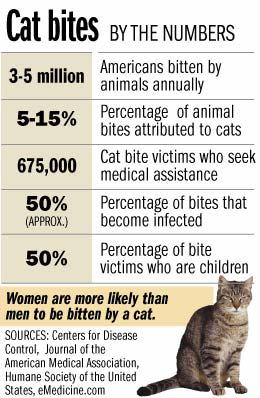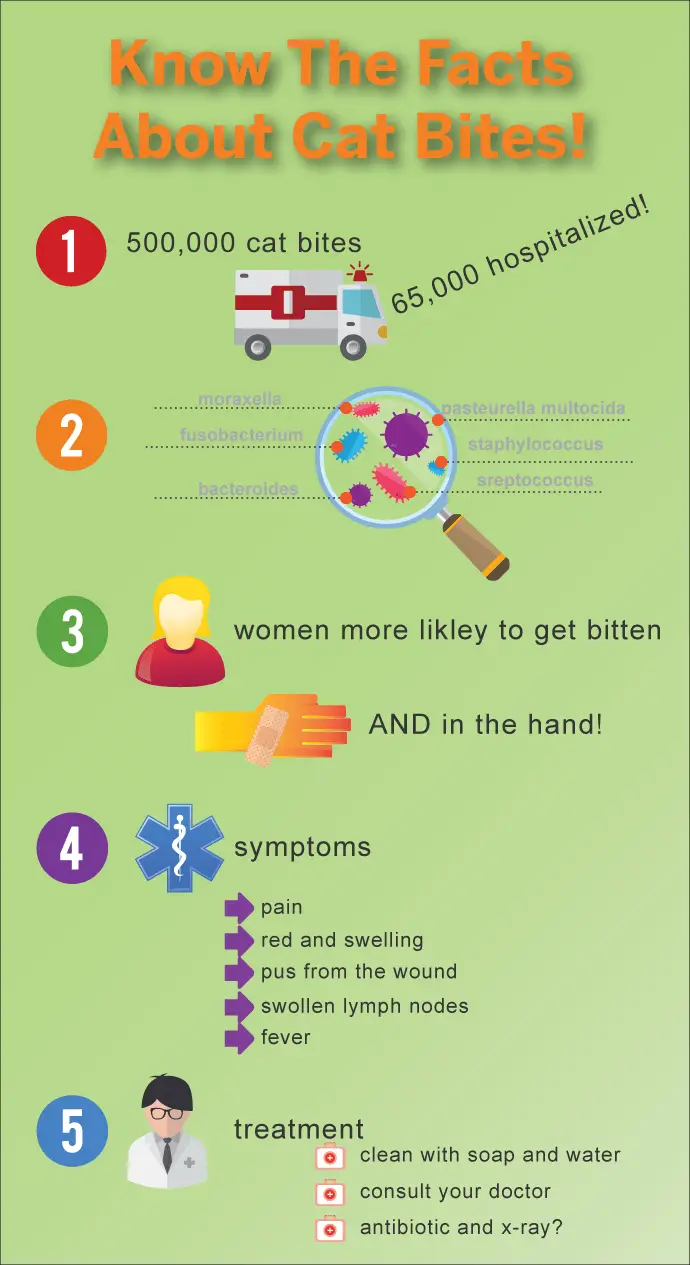
Cat bites account for only 10 to 15 percent of animal bites treated in emergency rooms. The problem is that as many as 50 percent of these cat bites become infected and require medical care. Bites are almost always inflicted either by the victim’s own cat, or by a cat belonging to a friend.
The sheer numbers of bites are surprising:

So what is it about cats that make their bite wounds so prone to infection?
Although cats have no more germs in their mouths than dogs or people, researchers at the Mayo Clinic found that when cats bite, their sharp teeth make relatively deep puncture wounds and can inject hard-to-treat bacteria into the skin and joints, increasing the risk for serious infection.
When the bite is on the hand (and other research has shown that up to 85 percent of cat bites occur on the hand or wrist), the puncture can quite easily pierce a joint or the membrane around a tendon. These joints and tendons have closed spaces and are easy for bacteria to enter and spread.
A similar type of injury can also happen with cat scratches. Their sharp, curved nails can penetrate deep into the skin, and inject bacteria into the puncture wound.
If you are bitten (or scratched) by a cat, here’s what to do right away:
First Response Steps:
1. Clean the wound immediately with lots of soap and water, rubbing alcohol, or hydrogen peroxide.
2. Put pressure on the wound to stop the bleeding.
3. Hold the wound above your heart if the bite is on your hand or arm.
4. Place a clean bandage over the wound.
5. Assess the wound for signs of infection: unusual redness or swelling, increasing warmth in the area, red streaking, or fever. See a doctor if signs of infection develop.
6. Get a tetanus shot if your primary series is incomplete or if it has been more than five years since your last shot.
7. Determine the rabies vaccine status of the cat. The cat should be observed for 15 days to see if it develops signs of rabies if its vaccine status is uncertain. Rabies is a virus that can be fatal if a vaccine is not administered in time.
*Please note that this information is not intended as a substitute for professional medical advice or treatment.
Seek medical care if the wound is gaping, if bleeding does not stop within 15 minutes, or if you have specific medical conditions or concerns. *As noted earlier, this information is not intended as a substitute for professional medical advice or treatment.
If you are bitten, and the wound is deeper than just a small break in the skin, go to an Emergency room as soon as possible. Cats have sharp teeth and a bacteria in their mouths called Pasteurella. When they bite hard, their sharp teeth act almost like a needle puncture pushing the Pasteurella deep into the muscle. Because their teeth are also small, the wound may close over right away, trapping the bacteria in.
Pasteurella is an anaerobic bacteria – it grows in the absence of oxygen. The infection happens very quickly and can be very painful, even when properly treated.
An infected cat bite wound will be red, swollen and painful, and the infection can spread through the surrounding tissues, causing a condition called cellulitis, or through the blood to other areas of the body, causing blood poisoning (called septicemia). People who get an infection may suffer from fever and flu-like symptoms and, rarely, may die without proper medical treatment. Children, the elderly, and those that are ill are particularly vulnerable to developing severe infections if bitten by a cat. You may need an x-ray of the injured area to check whether there is a foreign body lodged in the wound, or damage to any bones.
Middle-aged women are reported to be the group most often bitten by cats, with most bites occurring on the hand. Young children are more likely to have their faces close to the cat, so are more likely to be bitten there. {infographic courtesy of catbiteinfection.com}

Seeking treatment immediately will save you a lot of pain. Many people who have bad bites and don’t seek treatment end up with throbbing pain, a fever, a bad infection, and eventually an IV, antibiotics and even a partial cast. Recovery after a severe bite to the hand can take many weeks, and intensive physiotherapy may even be needed as scar tissue can reduce joint mobility. Despite prompt, intensive treatment some patients will have life-long joint thickening and arthritis.
Cat bites need to be taken seriously and carefully evaluated by a doctor. If you are bitten it’s best to seek medical help as soon as possible.
********



